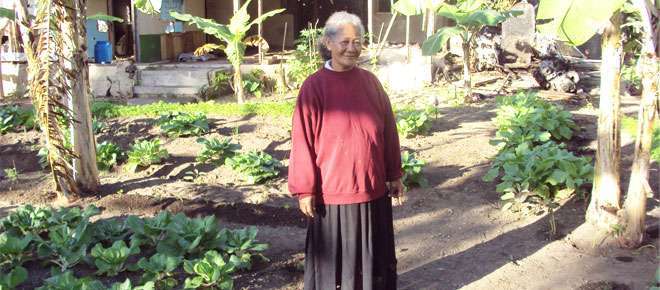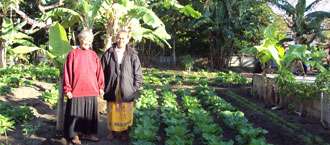Two groups of women in Tongatapu have taken their first steps into the world of market gardening, earning their own money for the first time in their lives.

In Tongatapu’s Kanokupolu and Kolovai villages two groups of women are taking their first steps into the world of market gardening. Now, thanks to Oxfam’s partner Tonga National Youth Congress (TNYC) they are earning money for the first time in the lives.
This initial taste of financial independence is spurring them on to explore further business opportunities, growing their confidence and the skills they need to provide themselves and their families with a brighter, more stable future.
Deep-rooted problems
Earning a living is hard in a country where jobs are few, transport is expensive and it is difficult to export goods. Many young people move overseas to New Zealand or Australia, where they can expect to earn a lot more than the average weekly wage in Tonga (around NZ$47*). Rural women often rely upon their husbands or overseas relatives for money. The majority of the women in Kanokupolu and Kolovai spent their time looking after their children and homes and growing food to eat in their gardens.
A natural step up
Organic farms generate good returns for farmers because organic products earn more at market. TNYC is training people across Tonga with farm and business management skills, ensuring they have the skills to run, expand and market their ventures.
The women of Kanokupolu and Kolovai possessed basic gardening skills but the TNYC is broadening their knowledge, teaching them how to use organic liquid fertilisers, how to make compost and how to adopt new farming techniques such as crop rotation and diversification. They give women vegetable seeds paid for by the Ministry of Agriculture and Fisheries.
The women have expanded their produce range from taro, yams and sweet potato to include popular veggies like lettuces, capsicums and eggplants. Between them they now grow carrots, onions, watermelons, tomatoes, parsley, chilli and bananas.
The families use the fresh vegetables for eating and sell the surplus through TNYC’s organic market in Nuku’alofa. Mele Vaea’uta’atu, 36, from Kanokupolu, managed to sell an impressive 20 baskets at market last harvest time.
A monthly fono with the TNYC Field Coordinator provides a forum for concerns and ideas to be raised. Kaufo’o Kaivelata (pictured above), 64, is the group’s matriarch and is always the first to ask for advice on ridding lettuces of persistent caterpillars. TNYC members answer as many questions as they can, visit the plots regularly and are always available for advice.
A blossoming venture
 In Kolovai the women sell their vegetables at the TNYC organic market with the help of one of their members who transports the veggies into town. Members make TOP$6 – $9 (NZ$4 – 6) from their veggies.
In Kolovai the women sell their vegetables at the TNYC organic market with the help of one of their members who transports the veggies into town. Members make TOP$6 – $9 (NZ$4 – 6) from their veggies.
This is only a small amount of money (a result of small plot sizes), but it covers basic necessities for their families and pays for the misinale (church obligation) that is so important to people in this religious country.
But there are big plans afoot. The groups want to explore the potential of supplying hotels and restaurants with their produce. This would generate much bigger profits which they would use to establish a seed bank. And they are seeking solutions to rid their plots of pests with an effective organic pesticide. The women want to encourage more girls to get involved with TNYC so have started thinking about the best route in to developing a handicrafts business with a stall at the market.
For elders in both villages it is not all about the amount of money the women are earning. They are happy to see young people back in the villages, engaged and earning for their families instead of relying upon others.
*Source: UNdata



